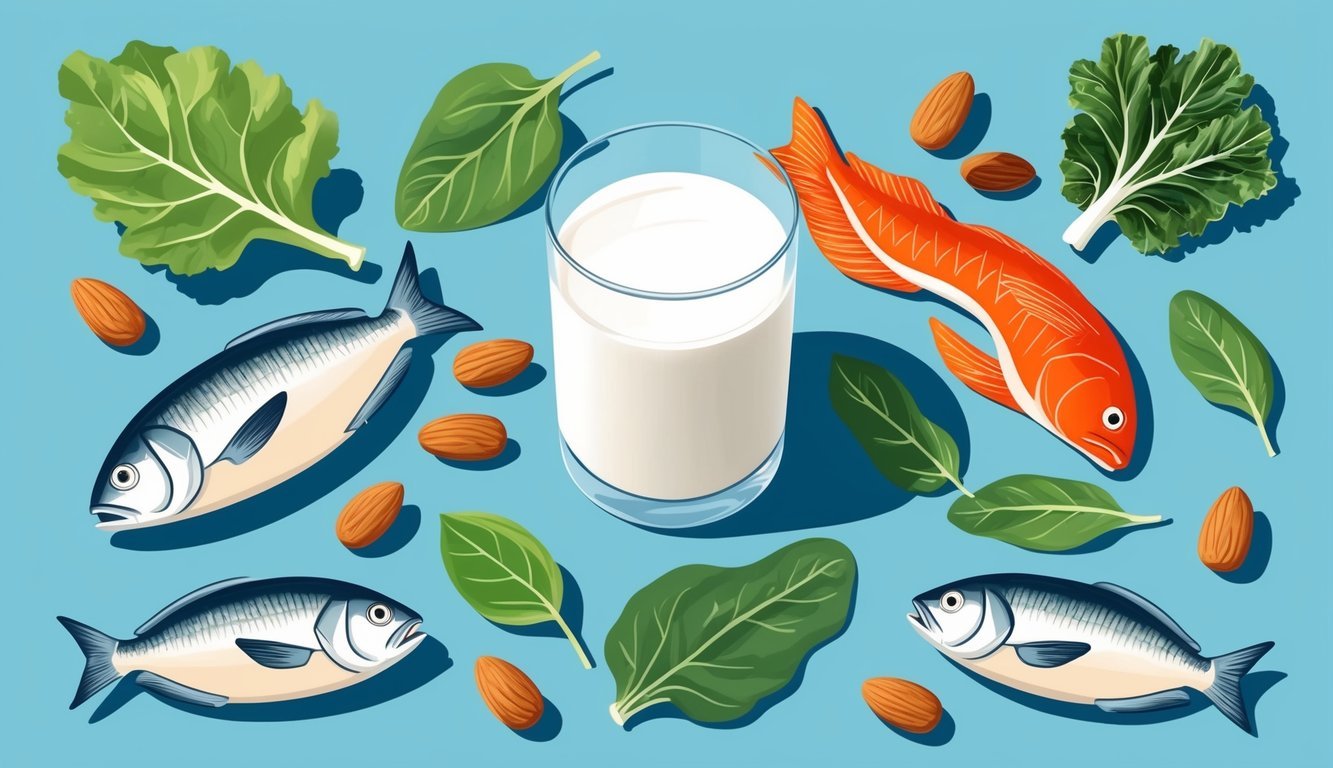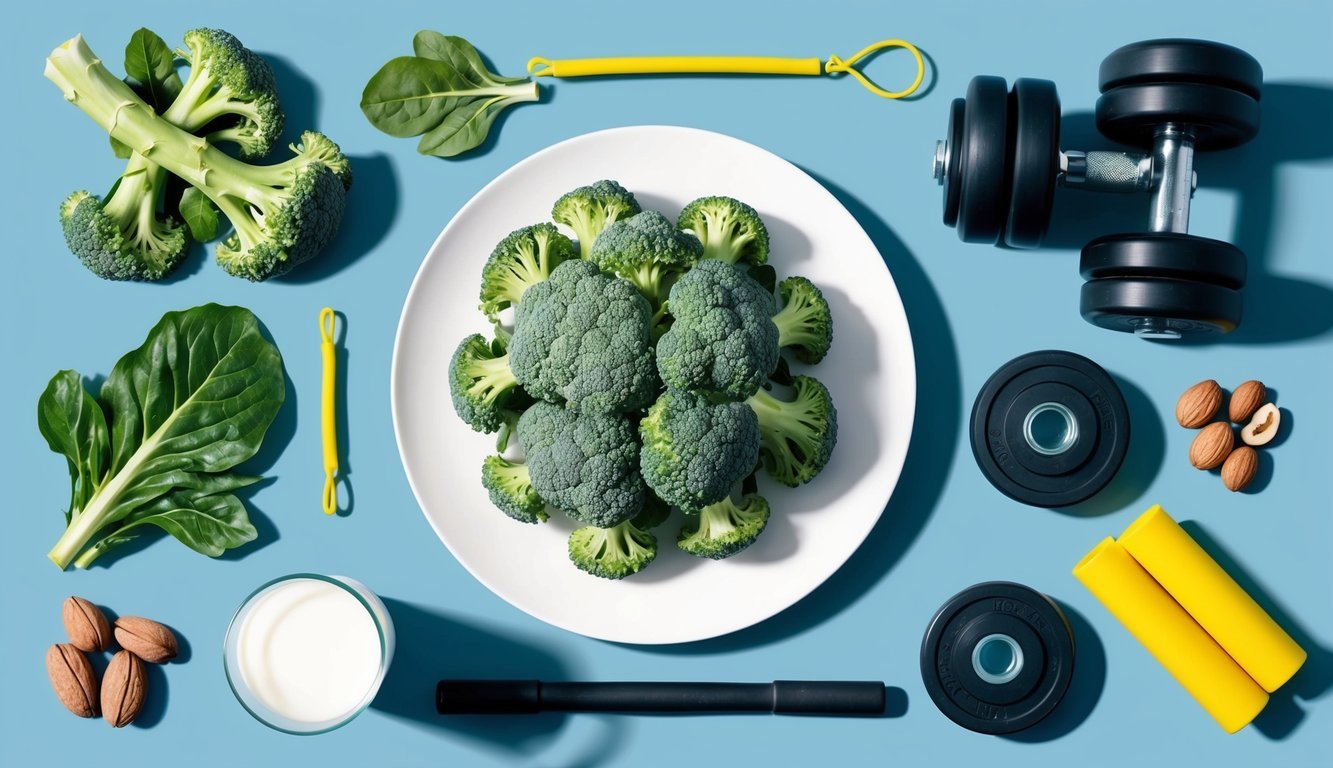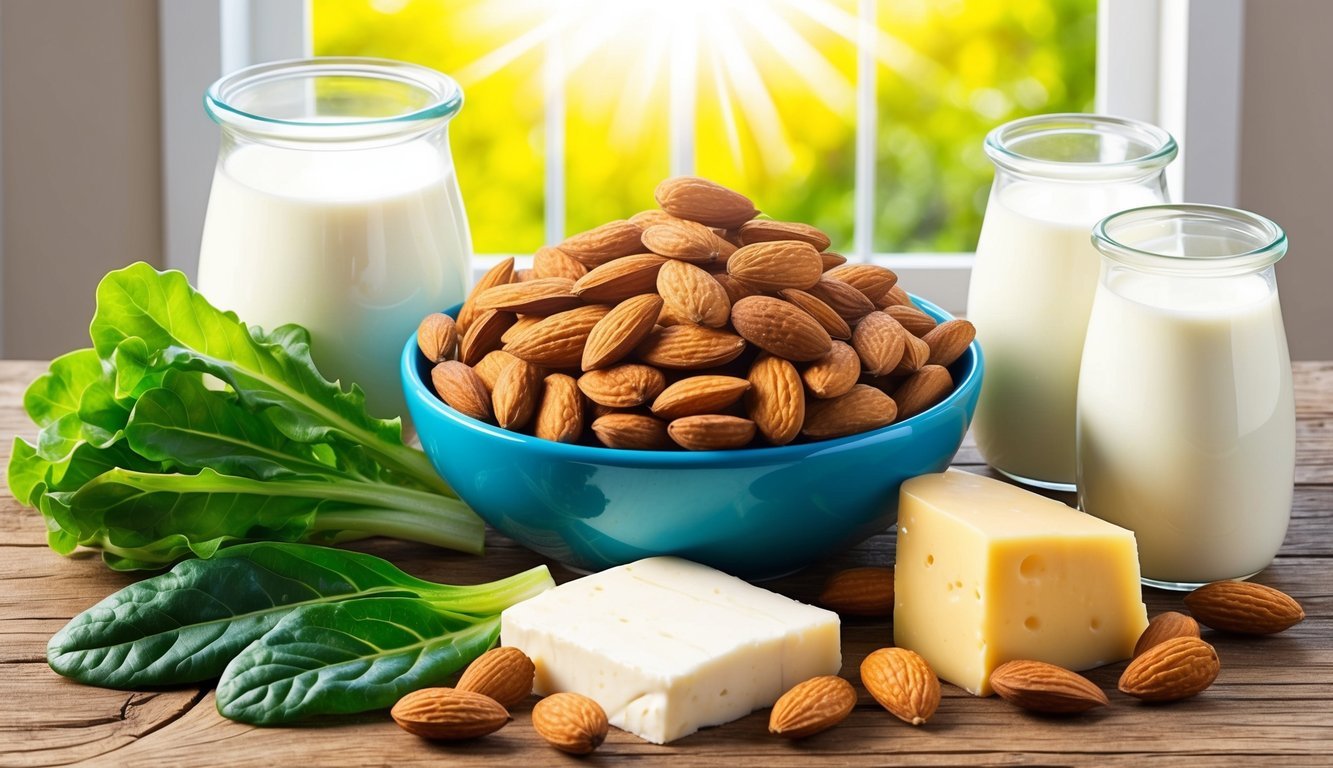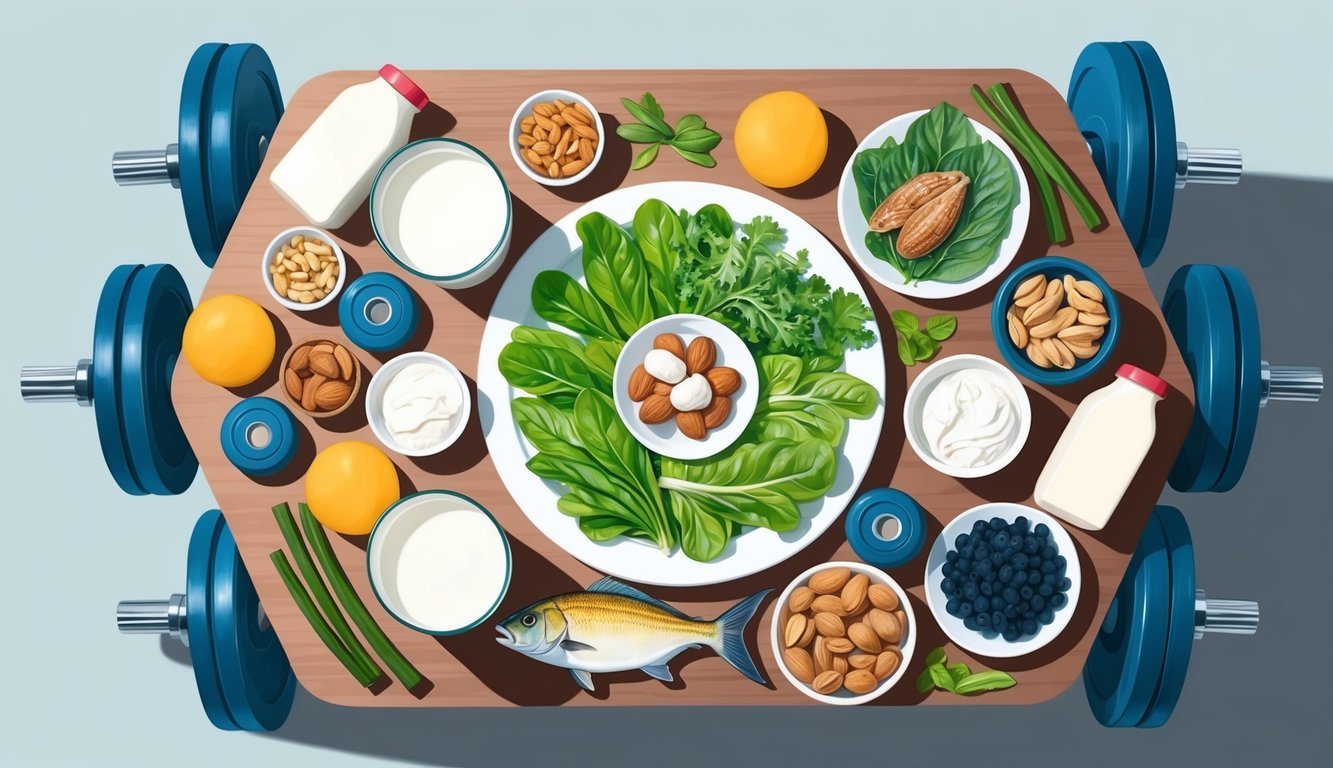As I get older, I’ve started to think more about my bone health.
It’s something that might not seem urgent when I’m younger, but maintaining strong bones can really make a difference in how I feel and move as I age. Taking proactive steps now can help prevent issues down the line and keep me feeling active and healthy.

I’ve discovered that there are simple habits I can incorporate into my daily routine.
Improving my nutrition, staying active, and avoiding certain harmful behaviors are all key components to ensuring my bones remain strong for years to come.
Understanding these tips is an important part of taking charge of my health.
1) Milk for calcium

When I think about strong bones, milk immediately comes to mind.
It’s packed with calcium, which is essential for maintaining bone density.
Drinking milk can help me meet the recommended daily intake of calcium.
For adults, that’s about 1,000 to 1,200 milligrams depending on age and gender.
Besides calcium, milk also provides vitamin D.
This vitamin helps my body absorb calcium more effectively.
If I prefer alternatives, fortified plant-based milks can also be good options.
Almond, soy, or oat milk often come enriched with calcium and vitamin D.
Incorporating milk into my diet isn’t difficult.
I can enjoy it straight, in smoothies, or as part of my morning cereal.
Making sure I get enough calcium from milk and other sources is a simple yet important step toward keeping my bones strong as I age.
Salmon for omega-3

When I think about caring for my bones, salmon comes to mind as a fantastic option.
It’s rich in omega-3 fatty acids, which are essential for bone health.
These omega-3s, particularly EPA and DHA, help reduce inflammation in the body.
This is important because inflammation can contribute to joint pain and stiffness, especially as we get older.
Incorporating salmon into my meals can also support calcium absorption due to its vitamin D content.
This combination is crucial for maintaining strong bones.
The American Heart Association recommends eating fatty fish like salmon at least twice a week for good reason.
It’s a great way to boost my omega-3 intake while keeping my heart health in check.
So, whether grilled, baked, or added to salads, salmon is an easy and delicious way to support my bones as I age.
Broccoli for Vitamin K

I’ve found that broccoli is a powerhouse when it comes to nutrients, especially vitamin K.
This vitamin plays a crucial role in bone health by helping to maintain bone mineral density.
Broccoli is not only packed with vitamin K, but it also provides calcium and magnesium, which are essential for strong bones.
Including this green veggie in my meals has become a priority.
I love how versatile broccoli is.
Whether I steam it, roast it, or toss it in a stir-fry, it fits well into various dishes.
Plus, it’s low in calories and high in fiber, making it a great option for a healthy diet.
Consuming enough vitamin K helps with calcium absorption in the bones, reducing the risk of fractures as I age.
So, keeping broccoli in my fridge is a simple way to boost my bone health.
4) Almonds for Magnesium

When I think about snacks that support bone health, almonds come to mind.
They’re not just tasty; they’re packed with essential nutrients.
Almonds are particularly rich in magnesium, which is vital for maintaining strong bones.
This mineral helps with bone formation and helps regulate calcium levels in the body.
I often grab a handful of almonds during the day.
They’re easy to incorporate into my diet, whether as a snack or added to meals.
Research suggests that magnesium from foods like almonds can support overall bone density.
Plus, those healthy fats in almonds promote better absorption of other nutrients.
So, if you’re looking for a simple way to boost your magnesium intake, consider almonds.
They’re a delicious and nutritious option that I always keep on hand.
5) Yogurt for probiotics
I always keep yogurt as a staple in my diet.
It’s not just a tasty snack; it’s packed with probiotics, which are beneficial bacteria for my gut health.
These friendly bacteria help my digestive system and may support the absorption of important nutrients.
That’s crucial for maintaining strong bones, especially as I age.
Yogurt also typically contains calcium and vitamin D, both essential for bone strength.
Combining probiotics with these nutrients can create a supportive environment for bone health.
I choose varieties with live and active cultures for the best benefits.
Greek yogurt is a favorite because it offers extra protein, which is important for muscle health and overall strength.
Incorporating yogurt into smoothies, parfaits, or just enjoying it plain keeps my meals fun and nutritious.
It’s an easy way to ensure I’m nurturing my bones while enjoying something delicious.
Spinach for Iron

When it comes to boosting bone health, I often think about the role of iron.
Spinach is one of those leafy greens that’s packed with iron.
It’s important for maintaining healthy blood, which in turn supports bone strength.
I find that incorporating spinach into my diet helps me meet my iron needs.
One cup of cooked spinach provides about 6.4 mg of iron, which is a significant contribution to my daily requirements.
Iron is crucial for producing hemoglobin, the protein in red blood cells that carries oxygen to my bones.
When my bones get enough oxygen, they can stay strong and functional.
Besides being rich in iron, spinach also offers other essential nutrients, like calcium and vitamin K, which are fantastic for bone health too.
I love adding spinach to smoothies, salads, and sautés for an extra nutrition boost.
By making spinach a regular part of my meals, I feel I’m giving my bones the support they need as I age.
It’s a simple way to take a step toward better overall bone health.
7) Eggs for Vitamin D
I’ve discovered that eggs are a great source of vitamin D, which plays a key role in bone health.
Vitamin D helps my body absorb calcium, a vital mineral for keeping bones strong.
When I include eggs in my diet, I’m benefiting from their nutritional value.
One large egg can provide about 10% of my daily vitamin D requirement.
This can be especially useful in the colder months when sunlight exposure is low.
Incorporating eggs into my meals is simple.
I enjoy them scrambled, poached, or in an omelet packed with veggies.
They’re not only versatile but also quite satisfying.
As I aim to maintain strong bones with age, eggs have become a staple in my kitchen.
They offer an easy way to boost my vitamin D levels while adding flavor to my meals.
Understanding Bone Health
I find it essential to grasp the fundamentals of bone health as I age.
Our bones are dynamic structures that require proper care and attention to maintain their strength.
This section dives into why having strong bones is crucial and how our bones change over time.
Why Strong Bones Matter
Strong bones are vital for overall health and mobility.
They provide structure to my body and protect vital organs.
Healthy bones help absorb shock, minimizing the risk of injury during falls or accidents.
As I age, bone density naturally decreases, which can lead to conditions like osteoporosis.
Maintaining bone strength reduces the likelihood of fractures, which can be debilitating.
Preventing these issues will help me stay active and independent as I grow older.
Key nutrients like calcium and vitamin D play significant roles in keeping bones healthy.
I’m committed to ensuring my diet includes these essentials for better bone health.
Weight-bearing exercises and strength training also contribute to maintaining strong bones by improving density and reducing the risk of osteoporosis.
In addition to a balanced diet, these activities are especially important for supporting bone health in women, as they are more prone to bone loss with age.
By staying active and making informed nutritional choices, I can promote long-term skeletal strength and overall well-being.
How Bones Change with Age
As I age, my bones undergo several changes.
From around age 30 onwards, bone mass slowly starts to decline.
This process is gradual but can become more pronounced, especially in women after menopause due to hormonal changes.
Additionally, the rate of bone resorption (the process where bone is broken down) outpaces the rate of bone formation.
This imbalance can lead to conditions like osteoporosis.
Regular exercise, particularly weight-bearing activities, can help counteract this decline by stimulating bone growth.
Staying active not only strengthens bones but also enhances muscle mass, supporting overall bone structure.
Understanding these changes motivates me to prioritize my bone health as I age.
Nutrition for Strong Bones

To maintain strong bones as I age, focusing on key nutrients like calcium, vitamin D, and protein is essential.
These nutrients play vital roles in maintaining bone density and overall skeletal health.
Importance of Calcium and Vitamin D
Calcium is one of the primary building blocks for bone structure.
I need to ensure I get enough of it daily.
The recommended intake varies by age, but adults generally need about 1,000 mg to 1,200 mg.
Good sources of calcium:
- Dairy products (milk, yogurt, cheese)
- Leafy greens (kale, broccoli)
- Fortified foods (orange juice, cereals)
Vitamin D is equally important as it helps my body absorb calcium effectively.
I can get vitamin D from sunlight exposure, fatty fish like salmon, and fortified foods.
Aim for at least 600 to 800 IU daily.
Role of Protein in Bone Health
Protein is another crucial component for bone health.
It helps maintain bone mass and influences muscle strength, which supports my bones.
As I age, I should aim for a protein intake of around 50-60 grams per day.
Protein-rich foods I can include:
- Lean meats (chicken, turkey)
- Fish (tuna, salmon)
- Legumes (beans, lentils)
- Dairy (eggs, cheese)
Striking a balance between these nutrients helps me build and maintain strong bones.
Reminding myself about these dietary choices can make a significant difference in my bone health over time.

